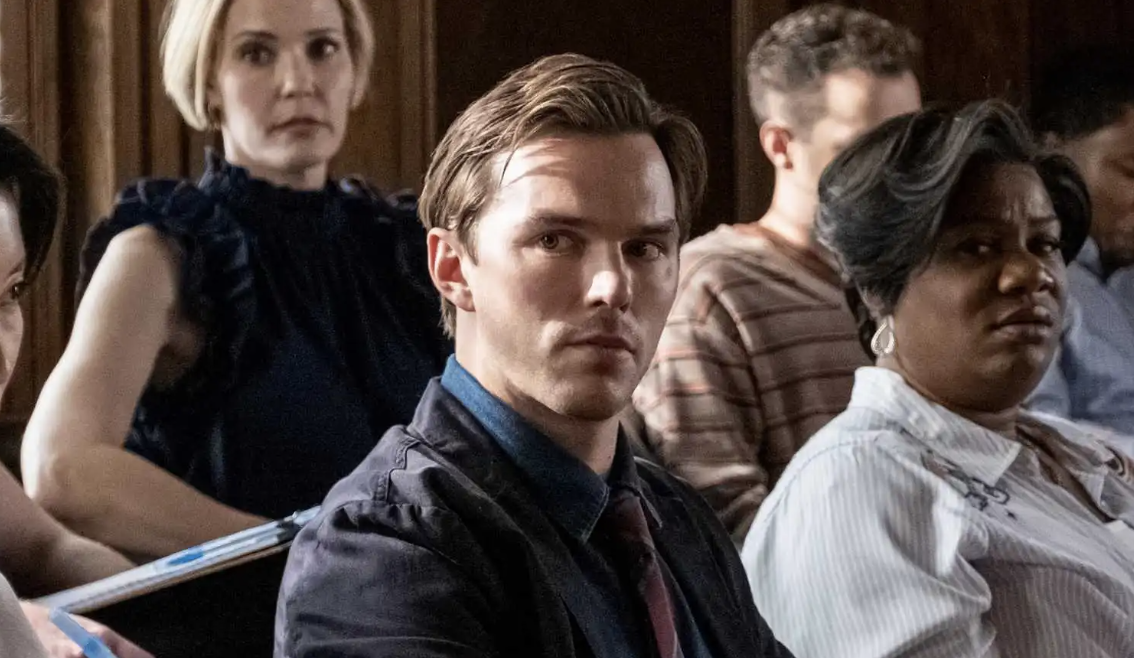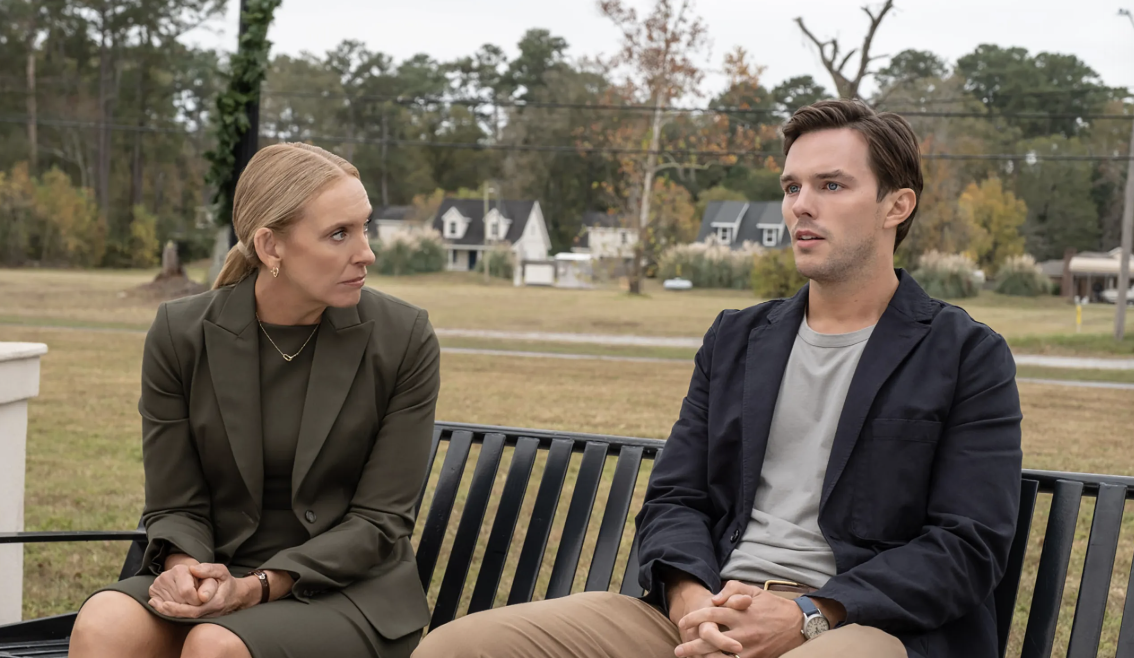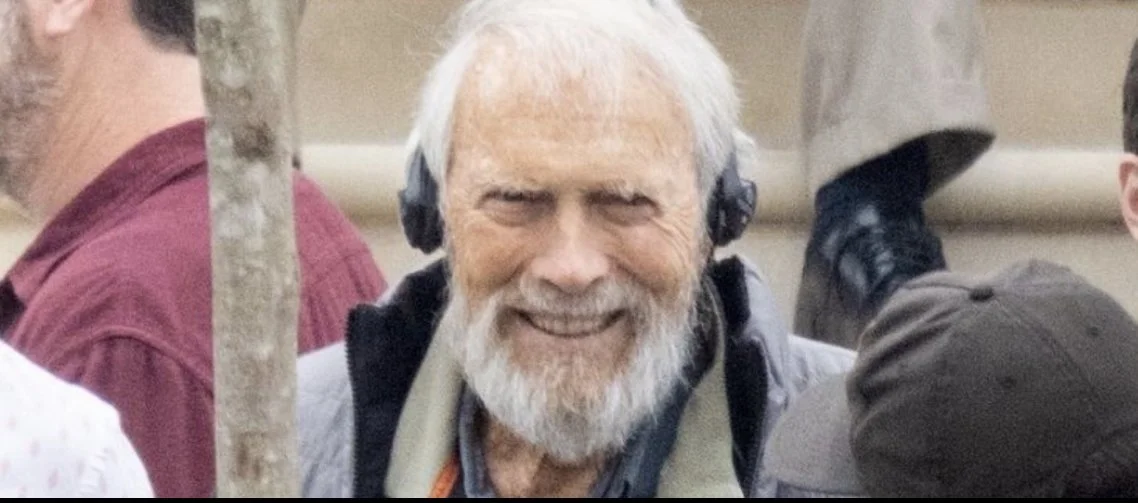A BODY OF WORK: Clint Eastwood's JUROR #2 (dir by Clint Eastwood, w/ Nicholas Hoult & Toni Collette, Warner Brothers, 114mns)
Clint Eastwood's most recent JUROR #2 is a strange movie at war with itself. And that's mostly a good thing.
The premise is a bit ridiculous then underplayed to maintain the tone. And yet, it is still a well-directed, well-acted, effective work about the horrible horrible gray area of the law, justice, conscience, facts.
Ultimately, it's about one of the toughest of all human conundrums: what is the right thing to do?
The movie follows 4 years sober alcoholic, expectant father Justin (Nicholas Hoult), Juror #2, who gets paneled on a murder trial only to realize the deer he thought he hit a year ago in a downpour may have been the "murdered" woman. And that her violent criminal boyfriend, now on trial, may be innocent.
The premise is a bit hard to go with. It requires a lot of coincidences and contortions. And even to a lay person, there's something that doesn't quite pass the "suspension of disbelief" test.
But if you put that aside and treat the movie on its own terms, there is a deep ambivalence and ambiguity to be mined here. And Eastwood mines it powerfully.
The movie tries to bat away the most obvious character decision at the very start. Justin feels (rightly) the thing to do is go immediately to the court and tell them the truth. He feels (also rightly) that he didn't do it purposefully and given the heavy rainstorm and posted signs saying "deer crossing", it is credible that he thought he hit a deer.
But his sponsor (Kiefer Sutherland), who also happens to be a lawyer, advises against it saying that in the state of Georgia, Justin would get a severe sentence given the particulars of the case. Justin was at the same bar as the couple. And even though he didn't drink that night, no jury would believe this of an alcoholic.
So Justin chooses his own self-preservation over potentially saving an innocent if flawed man. The movie does show Justin trying to get the jury to find the boyfriend "not guilty" as there is a reasonable doubt. But ultimately this feels feeble compared to coming forward with facts no one else has.
But still, who are we to judge?
Nobody looks forward to a jury summons….but this is ridiculous.
The movie, surprisingly, fits into a favorite sub-genre of Eastwood's body of work: the power of conscience and how knowledge of past bad acts done can haunt a person. Movies like HIGH PLAINS DRIFTER, HONKYTONK MAN, WHITE DEVIL BLACK HEART, UNFORGIVEN, A PERFECT WORLD, MYSTIC RIVER, MILLION DOLLAR BABY, GRAN TORINO, THE MULE all pulse with this theme.
In JUROR #2 there are at least two haunted souls-Nicholas Hoult's Justin and Toni Colette's Faith, the workaholic prosecutor on the case who is also running for district attorney. Faith knows getting a conviction on this case might push her to victory. But as details come out that cause her to doubt the defendant's guilt, we see that she too has doubts. And that she too wants real justice. And that her conscience is troubled.
BUT. . .it is not in her self-interest to have the defendant found "not guilty". And it's not in Justin's self-interest to have a mistrial (as that would prolong the search for the real killer).
Toni Collette’s prosecutor, Faith, and Nicholas Hoult’s juror #2, Justin, are set up as two conflicted souls haunted by conscience.
In many ways, JUROR #2 also takes its inspiration from a few classic movies about the law, justice, and jury systems. Sidney Lumet's 1950's classic TWELVE ANGRY MEN is the most obvious inspiration here. Both movies predominantly take place during jury deliberations. And Cedric Yarbrough's juror, Marcus King, is an almost 1 for 1 translation of Lee J. Cobb's Juror #3 from the earlier picture (though Yarbrough's righteous anger is more tightly controlled).
But Eastwood has also gone on the record with his love for an even earlier (and also Henry Fonda starring) classic, the William Wellman directed 1943 OX BOW INCIDENT about how a vigilante posse kills the wrong people. And there are definite traces of that moral conundrum here as well.
Eastwood does seem to feel that ultimately your choices DO catch up with you. And that you can't run away from your conscience. If you DON'T do the right thing, Eastwood seems to imply your decisions will haunt you.
In this way, Eastwood is staking out different moral territory than say Woody Allen in CRIMES AND MISDEMEANORS or MATCH POINT. In both those movies, Allen implies that sheer chance and randomness determine if someone is caught or held liable for their crimes. AND. . .if they aren't caught, they can easily live with their evil deeds because the power of the conscience is not as strong as people think.
But Eastwood seems to land far more strongly in Dostoyevsky moral/ethical territory. That is. . .that there is such a thing as a conscience. And it's powerful. And you can't escape it.
There are 20 year olds who would find it hard to keep the pace Clint Eastwood has maintained as a moviemaker for 50+ years.
What may be most important of all with JUROR #2 is how a 94 year old director like Clint Eastwood is still directing movies with most of the power of his best work. Eastwood's spare yet poetic style still finds perfect moments and images to distill themes.
There are numerous directors now in their 70's and 80's who aren't turning in work with the rigor of JUROR #2.
JUROR #2 may not be up there with Eastwood's absolute best work. But it is a worthy addition to Eastwood's body of work. And it deepens and enriches and complicates the themes he's spent a lifetime exploring.
Craig Hammill is the founder.programmer of Secret Movie Club.




